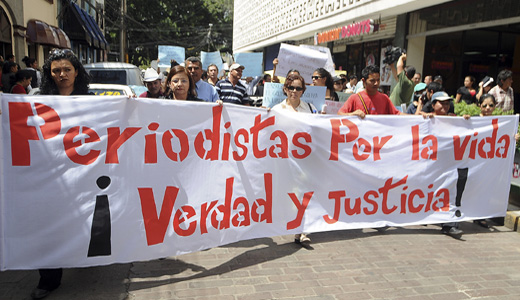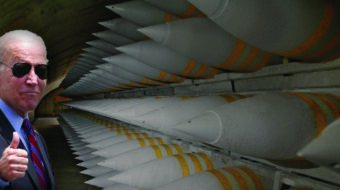
Former President of Honduras Manuel Zelaya offended established classes by allying Honduras with the left wing ALBA Latin American solidarity alliance and calling for a minimum wage for Honduran workers, so he was removed from office in a June, 2009 coup. In the year after Porfirio Lobo became president of Honduras the disaster for the Honduran people has become clear.
The toll of political murders under Lobo rose to 64 victims last month, reported human rights leader Bertha Oliva. According to the Global Peace Index, Honduras last year was Latin America’s second-most violent country.
After protesting school privatization plans and reduced school salaries, a teachers’ union paid the price: soldiers occupied their headquarters and a member was murdered. On January 25, tear gas and helicopter flyovers ended a street protest by another teachers’ union and four leaders were jailed on sedition and terrorism charges.
Kidnappings, death threats, military occupations, and victimization of reporters are pervasive. Human rights worker “Yuli X” told an interviewer of paramilitary intrusions in her community, a death threat against her 19-year-old daughter, and blacklisting. She went into exile after a comrade’s family members were killed. “State terrorism is the government’s policy against people who’ve decided not to be quiet,” she explained, but “people are in the streets and they aren’t going to be silent.”
The opposition National Front of Popular Resistance (FNRP) is under siege. After two days of police torture, FNRP leader Juan Chinchilla escaped on January 10. In hiding, he told an interviewer: “We are in struggling against the landowners … the government favors them and not the people.”
Chinchilla helps direct the Unified Campesino Movement of Aguan (MUCA), engaged in fighting big landowner takeovers of small farmers’ ancestral land in Bajo Aguan. A court decision last year nullified the Zelaya government’s agrarian reform Decree 18-2008 that enabled thousands of farmers to remain on their land.
The Lobo government designated much of Bajo Aguan as a “special administrative district,” thereby opening the door for public and private security forces to secure land for entrepreneurs like Miguel Facussé. He and others claimed vast acreage to produce palm oil for bio-fuels, A local priest, Fausto Milla reports that fighting over the contested lands has taken 35 lives.
In January soldiers and privately hired thugs occupied the Buenos Amigos community and burned homes. In Sabá 80 gunmen removed 120 MUCA-affiliated families. They hunted down MUCA leaders and jailed two of them. In Tocoa, armed men expelled 15 farm families and jailed 21 people including five women and five children.
The Garifuna people’s ancestral land rights in northeast Honduras are under similar attack. Their OFRANEH advocacy group says illegal land sales there to big buyers are multiplying. Community leaders and the community radio station director have received death threats.
The opposition is against the development of plants to convert African Palm residue into bio-gas. Facussé’s Dinant Group has attracted over $100 million in potential international investments for their plant. The bio-gas project is hyped as ideal for rich and poor nations to exchange carbon gas emission limits as prescribed by the Kyoto protocol and implemented under the UN’s Clean Development Mechanism. But on February 4, 78 environmental and human rights groups, OFRANEH among them, petitioned Great Britain to deny authorization and funding for the project.
These abuses play out with U.S. involvement under the guise of fighting drug trafficking. According to Wikileaks cables, U.S. embassy communications labeled the 2009 military coup as “totally illegitimate.” Nevertheless, Washington’s support for the post-coup governments continued. Other leaked cables show a just-elected Porfirio Lobo calling at the U.S. embassy to receive instructions on appointing his cabinet.
General René Osorio helped plot the coup. As of January, the School of the Americas graduate heads the armed forces. Early February visits to Tegucigalpa from U.S. Defense Department officials led to announcements that Honduras’ armed forces would expand, that a Plan Central America similar to Plan Colombia was contemplated, and that “regional security” would protect against drug trafficking.
The U.S. is building two new military bases in Honduras. Washington provides police training and has installed a military communications center for the Central American region. Drones now operate out of the Soto Cano Air Base (commonly known as Palmerola Air Base), a Honduran military base used by the U.S. military.
President Porfirio Lobo supports legislation that would remove the constitutional ban on presidential reelection. The FNRP is rejecting participation in elections set for 2013, opting instead for a constituent assembly approved by 1.3 million signatories on a petition the FNRP circulated last year. On January 26, 28 thousand regime opponents observed the one year anniversary of the Lobo presidency with anti-Lobo demonstrations.
Photo: A protest against on the attacks on journalists in Tegucigalpa, Honduras. International human rights monitors are investigating. The banner reads in Spanish “Journalists for life, truth and justice.” (Fernando Antonio/AP)












Comments